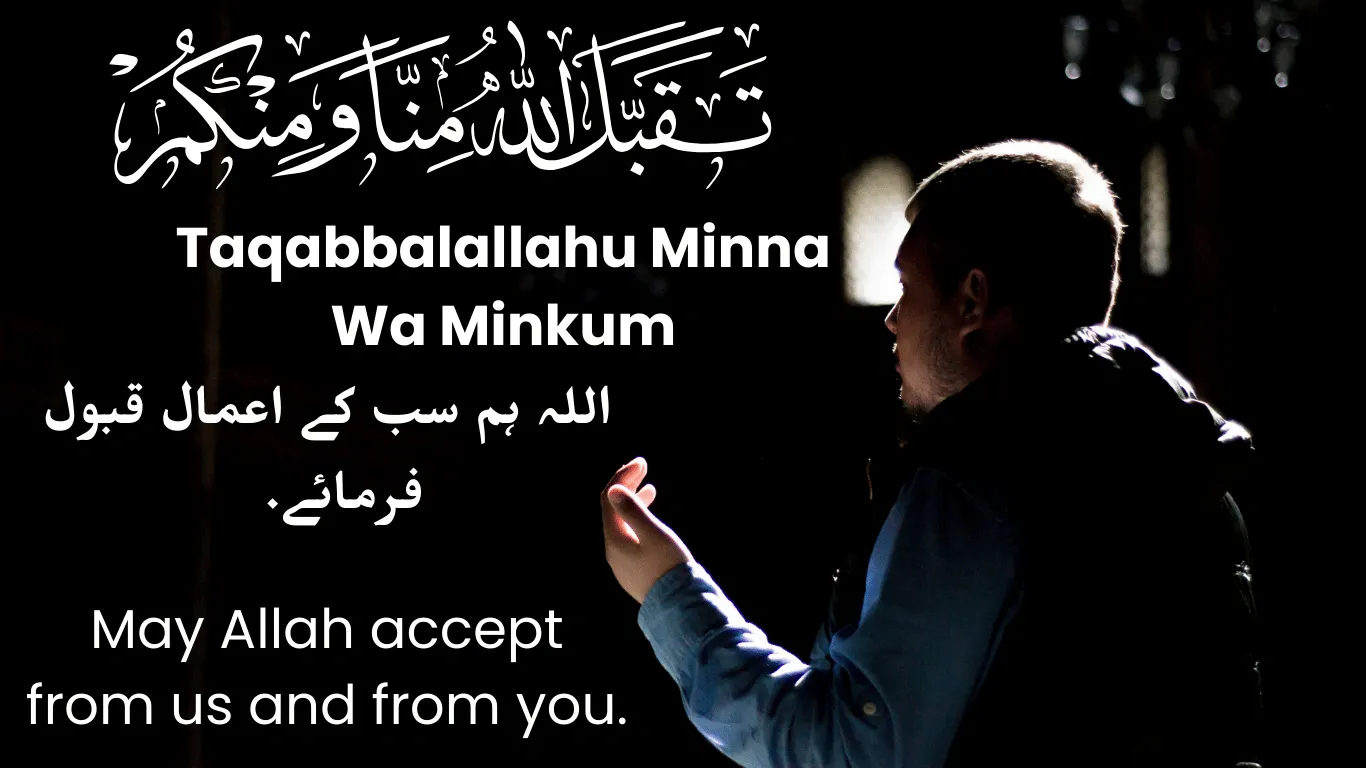The phrase Taqabbalallahu Minna Wa Minkum is a profound Islamic supplication commonly exchanged during Eid celebrations. It reflects the spirit of gratitude, humility, and unity among Muslims.
| Wa Khalaqnakum Azwaja in Arabic | وَخَلَقْنَاكُمْ أَزْوَاجًا |
| Surah Fatiha- Alhamdulillahi Rabbil Alamin |
| Kun Faya Kun (کُن فَیَکُوْن) Meaning in Urdu? |
| Iyyaka Na’budu Wa Iyyaka Nastaeen |
What Does Taqabbalallahu Minna Wa Minkum” Mean?
The phrase “تَقَبَّلَ اللَّهُ مِنَّا وَمِنْكُمْ” translates to:
“May Allah accept from us and from you.”
This simple yet powerful supplication expresses a heartfelt prayer for the acceptance of one’s good deeds and worship by Allah. It is a reminder of humility and the ultimate reliance on Allah’s mercy and acceptance.
Arabic Text and Pronunciation
Here is the full Arabic text of the phrase:
Arabic:
تَقَبَّلَ اللَّهُ مِنَّا وَمِنْكُمْ
Pronunciation:
Taqabbalallahu Minna Wa Minkum
Muslims commonly recite this phrase during significant occasions to invoke blessings and mutual prayers.
Urdu Translation
In Urdu, “تَقَبَّلَ اللَّهُ مِنَّا وَمِنْكُمْ” translates to:
“اللہ ہم سب کے اعمال قبول فرمائے۔”
This conveys the essence of asking Allah to accept everyone’s acts of worship and good deeds.
English Translation
The English meaning is:
“May Allah accept from us and from you.”
This translation highlights the prayer’s universal message of mutual goodwill and spiritual connection.
When to Use “تَقَبَّلَ اللَّهُ مِنَّا وَمِنْكُمْ”
This phrase is most commonly used during:
1. Eid al-Fitr and Eid al-Adha
Muslims exchange this phrase as part of their Eid greetings. It reflects gratitude for Allah’s blessings and a prayer for mutual acceptance of worship.
2. After Acts of Worship
It is also recited after significant acts of worship, such as fasting during Ramadan, performing Hajj, or offering sacrifices.
Spiritual Significance
The phrase “تَقَبَّلَ اللَّهُ مِنَّا وَمِنْكُمْ” embodies key spiritual values:
- Humility: Acknowledging that acceptance of deeds lies solely with Allah.
- Brotherhood: Promoting unity and mutual prayers within the Muslim community.
- Gratitude: Recognizing Allah’s blessings and seeking His pleasure.
How to Incorporate “تَقَبَّلَ اللَّهُ مِنَّا وَمِنْكُمْ” in Daily Life
- During Eid Celebrations: Exchange it as a part of your Eid greetings to spread goodwill and prayers.
- After Worship: Use it to conclude acts of worship like fasting or performing Hajj.
- Teach Its Importance: Share its spiritual meaning with children and others to encourage its practice.
FAQs
It signifies a prayer for Allah’s acceptance of good deeds and acts of worship, fostering humility and unity among Muslims.
It is most commonly recited during Eid greetings and after completing acts of worship like Ramadan fasting or Hajj.
The appropriate response is either “Ameen” or repeating the phrase: “تَقَبَّلَ اللَّهُ مِنَّا وَمِنْكُمْ.
By understanding and practicing the phrase “تَقَبَّلَ اللَّهُ مِنَّا وَمِنْكُمْ,” we can deepen our spiritual connection, promote unity, and enhance our Islamic traditions. May Allah accept all our good deeds and grant us His mercy. Ameen.




